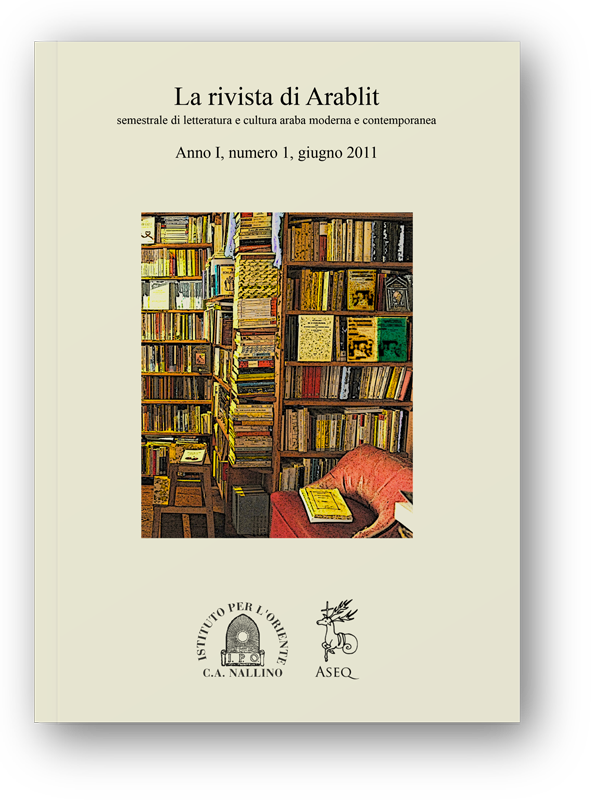“La rivista di Arablit” is an open access scientific journal (ANVUR Class A) founded in 2011 by Isabella Camera d’Afflitto, honorary professor at Sapienza University of Rome and former full professor of Modern and Contemporary Arabic Literature.
The journal is published by the Istituto per l’Oriente “Carlo Alfonso Nallino” of Rome. Since its foundation, “La rivista di Arablit” is under the patronage of the Department “Italian Institute of Oriental Studies – ISO” of Sapienza University of Rome.
“La rivista di Arablit” is specialized in the study of modern Arabic literature, covering mainly the period from the nahḍah to the present. It accepts papers dealing with other domains of Arabic culture, ranging from historical and political fields to critical discourse analysis and political discourse analysis. Moreover, it also accepts papers of interdisciplinary nature related to linguistic and literary research, comparative studies, music, and visual arts in the Arab world.
Founded as an online journal, it has been published also in paper format and distributed by Libreria Aseq since the issue n. 11 of June 2016. The journal has a six-monthly periodicity and publishes articles in Italian, French, English and Spanish.
The Scientific Committee of “La rivista di Arablit” is composed of scholars with renowned academic, international experience. The Editorial Committee comprises academic personnel from Italian and foreign universities.
The Scientific and Editorial Committees changed over the years. These variations are reported on the journal website, in the “Archive of the Scientific and Editorial Committees” section.
The articles are submitted to double-blind peer review process which supports the journal’s vision by making certain that every submitted paper is reviewed according to high ethical standards.
“La rivista di Arablit” publishes also book reviews, conference reports, and article reviews.
Authors and reviewers should comply with the journal publication ethics, on the basis of the principles established by the Committee on Publication Ethics (COPE), available below in this page.
On 30-12-2016 “La rivista di Arablit” (paper) was registered at the Press Register at the Court of Rome Press and Information Section (no. 245/2016).
On 30-12-2016 “La rivista di Arablit” (online) was registered at the Press Register at the Court of Rome Press and Information Section (no. 246/2016).
“La rivista di Arablit” is included in the list of Class-A academic journals by deliberation n. 96, 28 April 2023 of the ANVUR Board of Directors for the following academic fields and disciplines:
10/C1 – CINEMA, MUSIC, PERFORMING ARTS, TELEVISION AND MEDIA STUDIES
10/F4 – LITERARY CRITICISM AND COMPARATIVE LITERATURE
10/N1 – ANCIENT NEAR EASTERN, MIDDLE EASTERN AND AFRICAN CULTURES
10/N3 – CENTRAL AND EAST ASIAN CULTURES
“La rivista di Arablit” è una rivista scientifica di Classe A (ANVUR) in open access fondata nel 2011 da Isabella Camera d’Afflitto, professore onorario della Sapienza Università di Roma, (già) ordinario di letteratura araba moderna e contemporanea.
La rivista è edita dall’Istituto per l’Oriente “Carlo Alfonso Nallino” di Roma, con il patrocinio del Dipartimento “Istituto Italiano di Studi Orientali – ISO” della Sapienza Università di Roma.
“La rivista di Arablit” è specializzata nello studio della letteratura araba moderna e contemporanea prevalentemente dal periodo della nahḍah ad oggi; accoglie saggi relativi ad altri campi della cultura araba da quello storico-politico all’analisi critica e politica del discorso, ad ambiti interdisciplinari degli studi linguistico-letterari, comparatistici o sulle arti visive e musicali del mondo arabo.
Nata come rivista digitale, dal numero 11 del giugno 2016 è pubblicata anche in formato cartaceo ed è distribuita dalla Libreria Aseq. La rivista ha una periodicità semestrale e pubblica articoli in italiano, francese, inglese e spagnolo.
Il comitato scientifico è composto da studiosi dalla consolidata esperienza accademica internazionale. Fanno parte del comitato di redazione docenti di università italiane e straniere.
Nel corso degli anni il comitato scientifico e il comitato di redazione hanno subito delle variazioni segnalate nei numeri della rivista, oltre che nel sito della rivista, nella sezione “Archivio dei comitati scientifici e di redazione”.
Tutti gli articoli sono sottoposti al sistema di valutazione double blind peer review, che supporta il principio della rivista in base al quale ogni contributo inviato sia revisionato secondo elevati standard etici.
La rivista pubblica anche recensioni, conference report e article reviews.
Gli autori e i recensori si devono attenere alle norme del codice etico elaborato dal Committee on Publication Ethics (COPE), disponibile oltre in questa pagina.
In data 30-12-2016 “La rivista di Arablit” (cartacea) è stata iscritta al n. 245/2016 del Registro della Stampa presso il Tribunale di Roma Sezione per la Stampa e l’Informazione.
In data 30-12-2016 “La rivista di Arablit” (telematica) è stata iscritta al n. 246/2016 del Registro della Stampa presso il Tribunale di Roma Sezione per la Stampa e l’Informazione.
“La rivista di Arablit” è inclusa nell’elenco delle Riviste Scientifiche di Classe A per i seguenti settori concorsuali:
10/C1 – TEATRO, MUSICA, CINEMA, TELEVISIONE E MEDIA AUDIOVISIVI
10/F4 – CRITICA LETTERARIA E LETTERATURE COMPARATE
10/N1 – CULTURE DEL VICINO ORIENTE ANTICO, DEL MEDIO ORIENTE E DELL’AFRICA
10/N3 – CULTURE DELL’ASIA CENTRALE E ORIENTALE


